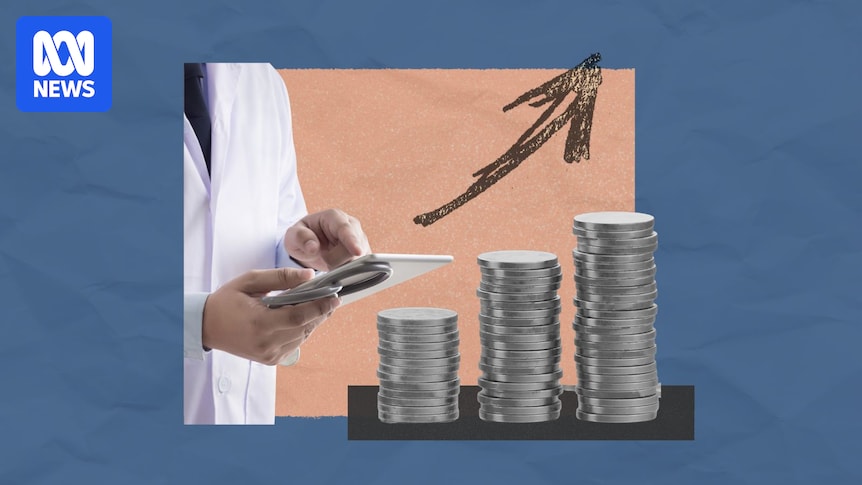Tens of thousands of Australians were allowed to withdraw more than $1.4 billion from their superannuation on compassionate grounds last financial year, representing another jump from previous years, with almost all of it spent on medical costs including dental work.
It has prompted the Australian Taxation Office (ATO) and the Australian Health Practitioner Regulation Agency (AHPRA), the health practitioner regulator, to call for the stamping out of business models and practices that seek to use superannuation to pay for “overly expensive or unnecessary medical treatments”.
Under the ATO’s access on compassionate grounds scheme, Australians can apply to take money out of their retirement funds to meet certain medical, palliative care, disability, death and home foreclosure expenses.
Do you have a story to share? Email Specialist.Team@abc.net.au
Since 2018-19 the vast majority of approvals for compassionate release have been for medical treatment or transport, and last year continued that trend.
The $1.37 billion approved for medical reasons in 2024-25 represents another jump from the just over $1 billion approved in 2023-24, and is close to $1 billion more than the $389 million in 2018-19.
The ATO said it was concerned that some health practitioners and registered agents were “inappropriately supporting individuals to access their superannuation on compassionate grounds, particularly for cosmetic procedures that aren’t aligned to compassionate release requirements”.
“While superannuation can be accessed early under compassionate grounds, this is strictly available in very limited circumstances including for critical medical and dental procedures,” said deputy commissioner Emma Rosenzweig.
“Compassionate release of super should only be considered as a last resort, where all other options of paying for the eligible expenses have been exhausted.”
Super Consumers Australia CEO Xavier O’Halloran said his organisation had received reports of people accessing their superannuation and being “massively overcharged” by medical practitioners.
“There’s some pretty poor practice out there. We’ve heard of cases where consumers were being given costings which were well above industry standards and basically people being taken advantage of,” he said.
Xavier O’Halloran says some patients have been “taken advantage of”. (ABC News: Chris Taylor)
Mr O’Halloran said it was important that people not be “blamed” for taking money out of their super for legitimate reasons.
“There is a broader problem here with the affordability of some medical care,” he said.
“One of the biggest reasons why people are taking money out is for dental. We have a healthcare system that doesn’t really cover many dental costs unless you’re in very particular circumstances.”
Dental procedures by far most common
The most popular kind of treatment, dental, saw $817.6 million approved in 2024-25.
Outside of dental, $254.9 million and $74.2 million was approved for weight loss and IVF treatments respectively last year — both increases from the year before.
Dental was by far the most popular form of treatment in 2024-25. (ABC News: Morgan Timms)
The figures for accessing super to pay for dental care have skyrocketed over the last seven years, with applications having more than doubled in the past two years.
Clinic owes patients more than $2 million in unfinished dental work
For the early withdrawal of super to be approved on medical grounds, two medical practitioners need to verify it is necessary to alleviate pain, to treat a life-threatening illness or injury, or alleviate mental illness.
The ATO said 30 per cent of the 93,500 applications for all medical treatments last year were rejected for not meeting their requirements for compassionate release.
“We are seeing practitioners making inaccurate statements in medical reports. The ATO relies on medical and dental professionals to act in the best interests of their patients to prepare accurate reports regarding their diagnoses and the required treatment strategy,” deputy commissioner Ms Rosenzweig said.
Due to their concerns, AHPRA and the Dental and Medical Boards of Australia have released new guidance for practitioners around the process, which required “a thorough assessment by an appropriately skilled practitioner, that prioritises the person’s health”.
“I’m stunned to hear that some businesses and practitioners are taking advantage of this process to push overly expensive or unnecessary treatments,” said AHPRA CEO Justin Untersteiner.
“There is an inherent trust that the community places in their practitioners and taking advantage of people in need is never acceptable.
“Any advice on what procedure is necessary should be based on the patients’ best interest and not influenced by financial gain or incentives.”
Justin Untersteiner is concerned by the conduct of some businesses and practitioners. (Supplied: AHPRA)
Anyone with concerns about a registered health practitioner’s professional performance or conduct can notify AHPRA.
Who is withdrawing the most?
People aged 31-55 were approved to withdraw their super early on compassionate grounds at the highest rates, making up 75 per cent of withdrawals in 2024-25.
Australians with incomes in the $45,001–$120,000 bracket continued to make up more than 60 per cent of all approvals, while Queensland (31 per cent), New South Wales (28 per cent) and Victoria (25 per cent) had the most residents approved.
Financial hardship resources:
Women (54 per cent) again made up a higher proportion of all people accessing super on compassionate grounds than men (46 per cent) last year.
The gender gap has been steadily closing since 2018-19 when women made up 64 per cent and men 36 per cent.
Experts have long cautioned the early withdrawal of super can leave people — particularly women — lacking in savings when it comes to retirement.
Mr O’Halloran said people should always seek a second medical opinion as withdrawing money from superannuation had a lasting economic impact.
“The cost of taking out $10,000 when you are in your 30s obviously compounds across your working life and can end up costing you at least twice as much as that by the time you retire,” he said.Loading…

